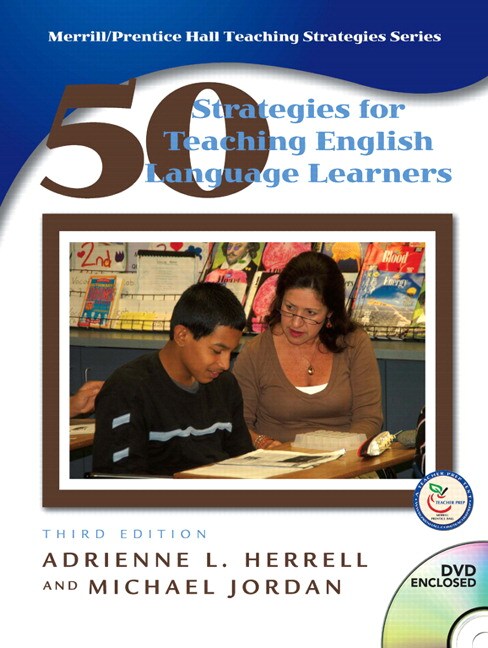
30.00$ - Purchase this E-book
Category : Higher Education
SECTION I Theoretical Overview SECTION II Strategies for Enhancing Instruction Through Planning Chapter 1 Predictable Routines and Signals: Reducing Anxiety Chapter 2 Visual Scaffolding: Providing Language Support Through Visual Images Chapter 3 Realia Strategies: Connecting Language Acquisition to the Real World Chapter 4 Interactive Read-Aloud: Reading Designed to Support Understanding Chapter 5 Advance Organizers: Getting the Mind in Gear for Instruction Chapter 6 Preview/Review: Building Vocabulary and Concepts to Support Understanding Chapter 7 Language Focus Lessons: Planning Lessons to Support the Acquisition of English Vocabulary and Structures Chapter 8 Academic Language Scaffolding: Supporting Student Use of Language in Academic Settings Chapter 9 Language Framework Planning: Creating a Framework Language Success Chapter 10 Skills Grouping: Planning for More Individualized Instruction SECTION III Strategies for Supporting Student Involvement Chapter 11 Total Physical Response: Integrating Movement into Language Acquisition Chapter 12 Shared Reading: Demonstrating How Reading Works Chapter 13 Leveled Questions: Adjusting Questioning Strategies to the Language Levels of Students Chapter 14 Manipulative Strategies: Using Objects to Connect Concepts Chapter 15 Partner Work: Practicing Verbal Interaction Chapter 16 Communication Games: Creating Opportunities for Verbal Interaction Chapter 17 Bilingual Books and Labels: Supporting Biliteracy Awareness Chapter 18 Cooperative Learning: Group Interactions to Accomplish Goals Chapter 19 Culture Studies: Learning Research Skills and Valuing Home Cultures in One Project Chapter 20 Learning Centers: Extending Learning Through Hands-On Practice Chapter 21 Imaging: Creating Visual Pictures to Support Understanding Chapter 22 Integrated Curriculum Projects: Using Authentic Projects to Bring Knowledge Together Chapter 23 Sorting Activities: Organizing Information into Categories Chapter 24 Collaborative Reading: What to Do When They Can't Read the Textbook Chapter 25 Multimedia Presentations: Oral Reports for the New Millennium Chapter 26 Reciprocal Teaching: Group Work with an Interactive Structure SECTION IV Strategies for Building Vocabulary and Fluency Chapter 27 Modeled Talk: Showing While You Talk Chapter 28 Reporting Back: Verbal Practice in Curricular Connections Chapter 29 Vocabulary Role Play: Building Vocabulary Through Dramatization Chapter 30 Vocabulary Processing: A Multistrategy Approach to Building and Using Vocabulary Chapter 31 Word Walls: Displaying and Organizing Wordsfor Easy Access Chapter 32 Story Reenactment: Making Stories Come to Life! Chapter 33 Scripting: Practicing Verbal Interactions Chapter 34 Practicing Verbal Communication to Build Confidence, Vocabulary, and Comprehension Chapter 35 Writing Workshop: Supporting the Acquisition of English Writing Competence SECTION V Strategies for Building Comprehension Chapter 36 Read-Aloud Plus: Supporting Understanding While Teaching Comprehension Strategies Chapter 37 Language Experience Approach: Building on an Experience to Create a Written Account Chapter 38 Interactive Writing: Developing Writing Skills Through Active Scaffolding Chapter 39 Guided Reading: Providing Individual Support Within a Group Setting Chapter 40 Interactive Comprehension Building: Using Technology to Build Background Knowledge Chapter 41 Cloze: Using Context to Create Meaning Chapter 42 Attribute Charting: Organizing Information to Support Understanding Chapter 43 Cohesion Links: Understanding the Glue That Holds Paragraphs Together Chapter 44 Learning Strategy Instruction: Acquiring Self-Help Skills Chapter 45 Dictoglos: A Strategy for Improving Listening and Oral Communication Skills Chapter 46 Free Voluntary Reading: Nothing Helps Reading Like Reading Chapter 47 Repetition and Innovation: Getting to Deep Comprehension Through Multiple Interactions with a Book Chapter 48 GIST: Exploring Tough Text Chapter 49 Syntax Surgery: Visually Manipulating English Grammar Chapter 50 Multiple Intelligences Strategies: Teaching and Testing to Student-Preferred Learning Modes Teacher Resources An Informal Multiple Intelligences Survey English Language Development Profiles Table of Contents
Get Fifty Strategies for Teaching English Language Learners, 3rd Edition by Adrienne L. Herrell, Florida State University Michael L. Jordan, California State University, Fresno


0 commentaires:
Enregistrer un commentaire